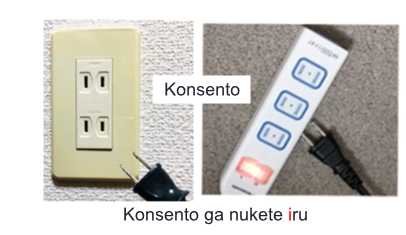|
Enrich your expressions For Upper Beginner and Intermediate learners |



|
Pasokon ga ugokanai
My computer doesn't work.
The verb ugokimasu / ugoku means "to move", "to run" or "to drive".
See "Essential Japanese Verbs No.026".
This verb also have the meaning of "to work" with machinery.
Especially the negative [machinery] ga ugokanai is frequently used in daily conversation.
Example sentences
 |
1. | Are? Pasokon ga ugokanai. |
are? Um..., Huh?, What?, pasokon personal computer
 |
2. | Are? Eakon ga ugokanai. Aa..., Rimokon no denchi ga nai. |
are? Um..., Huh?, What?, aa Ah!, Oh!, Hi, Yes
eakon air conditioner, rimokon remote-control
denchi ga nai the battery is dead, the battery ran out (expression)
denchi battery, nai nai form of arimasu; do not have, be not
 |
3. | Are? Soojiki ga ugokanai. A! Konsento ga nuketeru (nukete iru). |

are? Um..., Huh?, What?, A! Oh!, Oops!
soojiki vacuum cleaner, konsento wall outlet (Wasei-Eigo "Japanese-made English")
konsento ga nukete iru the cable is disconnected, the cable is plugged out
nukete te form of nukemasu; fall out, come out, -te iru expressing progressive or state
i in -te imasu / -te iru is often (almost always) omitted, and
it becomes -te masu / -te ru in daily conversation.
 |
4. | Denshi-renji ga ugokanai. Kinoo wa ugoita noni. |
denshi-renji microwave (oven), kinoo yesterday
ugoita ta form of ugokimasu, -noni expressing one's regret or disappointment; despite, in spite of, although
 |
5. | Sumaho ga ugokanai. Sakki otoshita kara, kowareta no kamo shirenai. |
sumaho smartphone, sakki some time ago, a little while ago
otoshita ta form of otoshimasu; drop, -kara because, therefore, so
kowareta ta form of kowaremasu; break, -(no) kamo shirenai expressing possibility; possibly, could be, probably, maybe
-no in -no kamo shirenai is added when the speaker brings up an issue, topic or question
 |
6. | Sentaku-ki ga ugokanaku natta. Kore wa furui kara, kowareta mitai. Atarashii no o kaoo. |
sentaku-ki / sentakki washing machine, ugokanaku made from the nai form ugokanai
-naku narimasu expressing a change; come not to do, become not able to do, natta ta form of narimasu; become, come to
furui old, -kara because, therefore, so, kowareta ta form of kowaremasu; break, -mitai it seems, it looks
atarashii no new one, atarashii new, -no representing an object which is clearly understood
kaoo volitional form of kaimasu; let's buy
Practice the following words
Functional patterns used in the sentences (Chapter numbers are from Building Up Conversation)
konsento ga nukete (i)ru
verb te form + -te imasu:expressing the progressive, a state of being or a habitual action
Level 2 Chapter 4
kinoo wa ugoita noni
plain form + -no ni,:despite, in spite of, although
Level 3 Chapter 17
otoshita kara / furui kara
plain form + kara:expressing a reason or a cause; because, therefore, so
Level 2 Chapter 3
ugokanaku natta
-naku narimasu:expressing a change; come not to do, become not able to do
Level 3 Chapter 5
kowareta mitai
mitai desu:It seems, it looks
Level 3 Chapter 4
atarashii no o kaoo
-yoo, -oo:verb volitional form "Let's do"
Level 2 Chapter 18
| Copyright (C) | CosCom Language Service, Inc. | All Rights Reserved. |